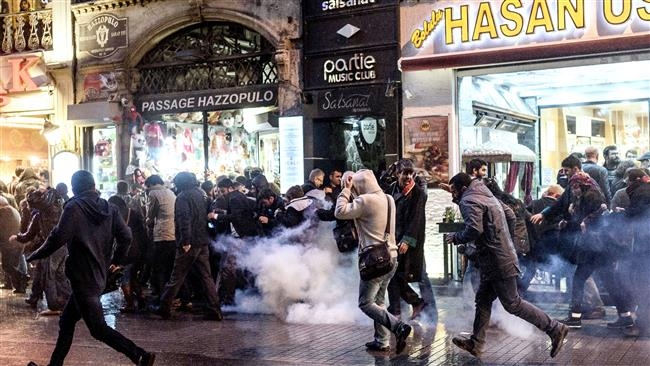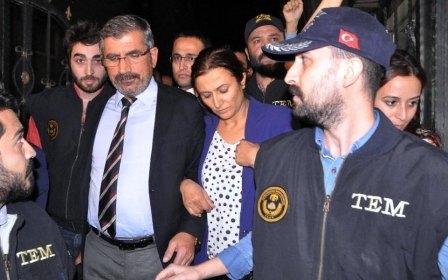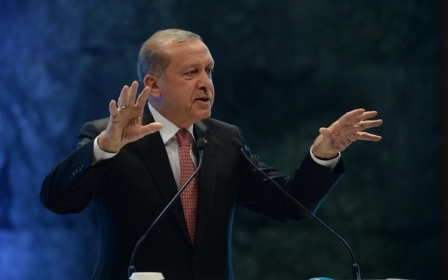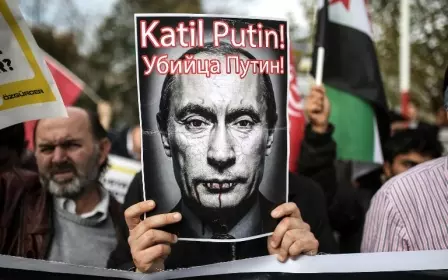Killing of Kurdish human rights lawyer prompts protests across Turkey

Kurdish demonstrators took to the streets across Turkey Saturday in protest against the death of Kurdish lawyer Tahir Elci.
Elci, head of the Diyarbakir Bar Association, was killed Saturday during a gun battle in the Sur district of Diyarbakir. Two policemen also died in the clashes.
State-run media in Turkey was quick to level the blame at the Kurdistan Workers Party (PKK), but many Kurdish activists, including the pro-PKK Firat News Agency, blamed his death on the Turkish police.
Demonstrations broke out in Istanbul, Ankara, Izmir and Diyarbakir which were met by tear gas and water cannons. Two Kurdish militants were killed later Saturday in Sur after police imposed a curfew.
Video shows Tahir Elci's funeral
Thousands attended the funeral of Elci in Diyarbakir Sunday, including co-chair of the People’s Democracy Party (HDP) Selahattin Demirtas.
Speaking at the funeral, Demirtas blamed the lack of adequate protection for public figures in Turkey’s southeast for Elci’s death.
"What killed Tahir was not the state, but the lack of state,” he said.
'Assassination'
A Turkish government official told the BBC Saturday that they were investigating the possibility that a “third party” had been involved in Elci’s death.
“At this time, we believe that Mr Elci may have been caught in the crossfire, but we aren’t ruling out the possibility that a third party directly targeted him.”
Speaking Saturday, Prime Minister Ahmet Davutoglu also mooted the possibility that Elci had been assassinated.
“There are two possibilities,” he said during a televised speech.
“One of them is an assassination. If there is such a thing, this will be revealed,” he said, the other possibility being that he was caught in crossfire.
Numerous armed groups operate in Turkey apart from the PKK, including Turkish ultra-nationalists, Islamists and Marxist-Leninists.
Davutoglu offered his condolences, saying that the “target is not only Elci, but Turkey".
Before his death, Elci had been under threat of imprisonment for comments made on CNN Turk in October in which he said that the PKK was “not a terror organisation".
A Turkish prosecutor demanded that Elci be jailed for seven years and six months for “making propaganda of a terror organisation,” and at the time of his death Elci was barred from travelling out of Turkey.
Following the killing, Metin Feyzioglu, head of the Union of Turkish Bar Associations, called on the heads of all Turkey’s bar associations to travel to Diyarbakir in a show of support.
“The target is our unity, our fraternity,” he said. “For this reason we should all stand together as one against this attack. For this reason, me and my friends in the executive board of TTB are immediately departing for Diyarbakır.”
Elci had previously called for an end to violence in Turkey, particularly since the breakdown in the ceasefire between the PKK and the Turkish state in July, and criticised both sides for their excesses.
Shortly before his death, he told a press conference that peace needed to prevail in the southeast.
“We do not want guns, clashes or operations here."
New MEE newsletter: Jerusalem Dispatch
Sign up to get the latest insights and analysis on Israel-Palestine, alongside Turkey Unpacked and other MEE newsletters
Middle East Eye delivers independent and unrivalled coverage and analysis of the Middle East, North Africa and beyond. To learn more about republishing this content and the associated fees, please fill out this form. More about MEE can be found here.




